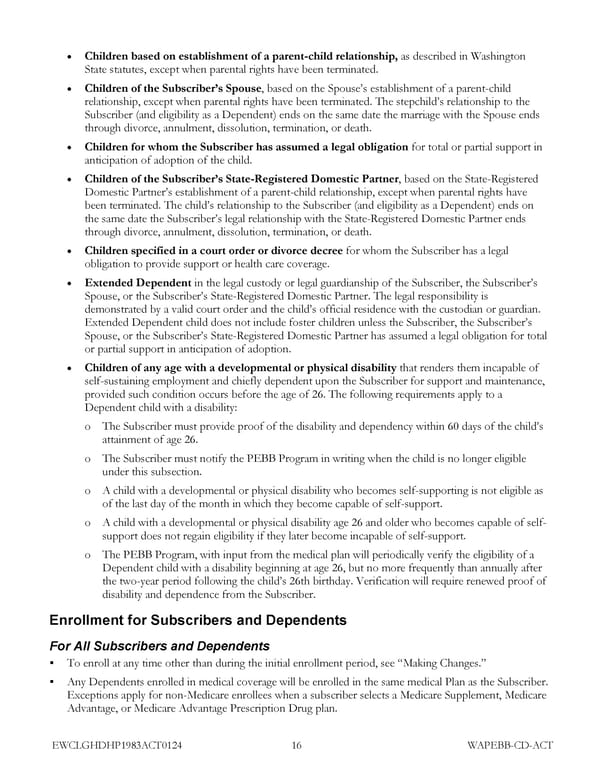• Children based on establishment of a parent-child relationship, as described in Washington State statutes, except when parental rights have been terminated. • Children of the Subscriber’s Spouse, based on the Spouse’s establishment of a parent-child relationship, except when parental rights have been terminated. The stepchild’s relationship to the Subscriber (and eligibility as a Dependent) ends on the same date the marriage with the Spouse ends through divorce, annulment, dissolution, termination, or death. • Children for whom the Subscriber has assumed a legal obligation for total or partial support in anticipation of adoption of the child. • Children of the Subscriber’s State-Registered Domestic Partner, based on the State-Registered Domestic Partner’s establishment of a parent-child relationship, except when parental rights have been terminated. The child’s relationship to the Subscriber (and eligibility as a Dependent) ends on the same date the Subscriber’s legal relationship with the State-Registered Domestic Partner ends through divorce, annulment, dissolution, termination, or death. • Children specified in a court order or divorce decree for whom the Subscriber has a legal obligation to provide support or health care coverage. • Extended Dependent in the legal custody or legal guardianship of the Subscriber, the Subscriber’s Spouse, or the Subscriber’s State-Registered Domestic Partner. The legal responsibility is demonstrated by a valid court order and the child’s official residence with the custodian or guardian. Extended Dependent child does not include foster children unless the Subscriber, the Subscriber’s Spouse, or the Subscriber’s State-Registered Domestic Partner has assumed a legal obligation for total or partial support in anticipation of adoption. • Children of any age with a developmental or physical disability that renders them incapable of self-sustaining employment and chiefly dependent upon the Subscriber for support and maintenance, provided such condition occurs before the age of 26. The following requirements apply to a Dependent child with a disability: o The Subscriber must provide proof of the disability and dependency within 60 days of the child’s attainment of age 26. o The Subscriber must notify the PEBB Program in writing when the child is no longer eligible under this subsection. o A child with a developmental or physical disability who becomes self-supporting is not eligible as of the last day of the month in which they become capable of self-support. o A child with a developmental or physical disability age 26 and older who becomes capable of self- support does not regain eligibility if they later become incapable of self-support. o The PEBB Program, with input from the medical plan will periodically verify the eligibility of a Dependent child with a disability beginning at age 26, but no more frequently than annually after the two-year period following the child’s 26th birthday. Verification will require renewed proof of disability and dependence from the Subscriber. Enrollment for Subscribers and Dependents For All Subscribers and Dependents To enroll at any time other than during the initial enrollment period, see “Making Changes.” Any Dependents enrolled in medical coverage will be enrolled in the same medical Plan as the Subscriber. Exceptions apply for non-Medicare enrollees when a subscriber selects a Medicare Supplement, Medicare Advantage, or Medicare Advantage Prescription Drug plan. EWCLGHDHP1983ACT0124 16 WAPEBB-CD-ACT
 Kaiser Permanente NW CDHP EOC (2024) Page 22 Page 24
Kaiser Permanente NW CDHP EOC (2024) Page 22 Page 24